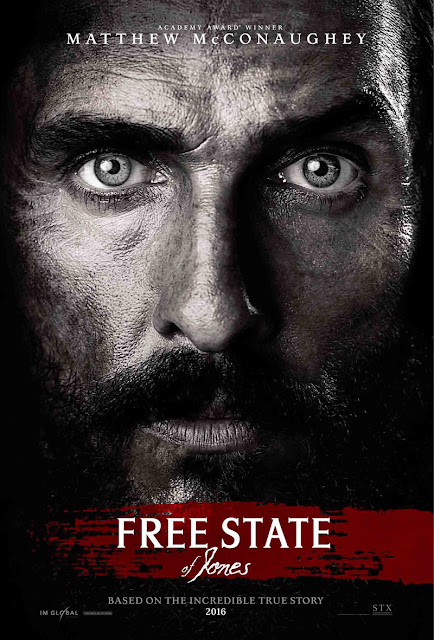Matthew McConaughey Bares His Soul: The Daily Beast: "As told by Free State of Jones, Knight was a fierce leader who believed that love is love, and also believed in using deadly force for a cause. In his time, both acts openly defied the laws and morals of the American government...
 Knight’s journey, he notes, was an evolution that only began when he stood up for his individual rights, fed up by a Confederate Army that was exploiting the men and women of the South to fuel its war machine. “‘You can’t treat me like that,’ ‘You can’t take my mama’s mule,’ ‘You can’t make me fight for your rich man’s war,’ that turned into, ‘You can’t treat my neighbor like that.’ And that turned into, ‘You can’t treat anyone like that.’”
“This man’s sense of his family became the sense of a family of man—mankind, womankind, all kind,” he continues. “But it started off as very selfish. You can’t treat me like that. You can’t take ten percent of what I own. He was defending his own rights, and that became defending freedom for everyone.”
Knight’s journey, he notes, was an evolution that only began when he stood up for his individual rights, fed up by a Confederate Army that was exploiting the men and women of the South to fuel its war machine. “‘You can’t treat me like that,’ ‘You can’t take my mama’s mule,’ ‘You can’t make me fight for your rich man’s war,’ that turned into, ‘You can’t treat my neighbor like that.’ And that turned into, ‘You can’t treat anyone like that.’”
“This man’s sense of his family became the sense of a family of man—mankind, womankind, all kind,” he continues. “But it started off as very selfish. You can’t treat me like that. You can’t take ten percent of what I own. He was defending his own rights, and that became defending freedom for everyone.”
Historical accounts suggest he snuck into the home of Confederate Major Amos McLemore, who had led efforts to hunt down deserters, and shot him dead, right in the back. The film depicts him as a noble but brutal leader who wasn’t afraid to kill his enemies to defend his community and its people. “He was not a ‘turn the other cheek’ New Testament guy,” McConaughey chuckled, offering the understatement of the century. “One of the things I noticed about him was if he saw something that was wrong or unjust, he really had no way to ignore it. It was not in his DNA to ignore it, damned be the consequences. He didn’t lose sleep over any decisions he made. That’s something I really admired about the guy.”
Portraying Knight and his righteous crusade had its great difficulties. Neither McConaughey nor his costars shy away from using the n-word, for example. “Personally, I think you put it out there in front of a light and let’s examine that, let’s examine what its historical meaning is, what its present meaning is,” he explained to Moviefone. “And understand how it hurts. It was a hard but beautiful scene that we did.” The ugliness of slavery and the continued murder, disenfranchisement, and exploitation of African-Americans during Reconstruction, which comprises the film’s final act, are important truths to confront...
"Taking my children to set and saying, ‘This is a horrible thing, but it’s true. And you know what, the truth burns. But I’d rather us talk about some really ugly scars in our history that are still relevant today than you go play Call of Duty and shoot a bunch of people in a video game.’” “It happened. It’s real. So let’s sit here and go, ‘Yeah, guess what man, the world is not all clean and neat. We want to expect the best in everyone but we have to understand that we all have good and bad in us, and these are some times when we’ve made mistakes, there are some things where people were just wrong, and this is how we’ve improved and are still evolving. This is a situation that you will be handed and which will be more evolved when you get to it.’”"
No comments:
Post a Comment